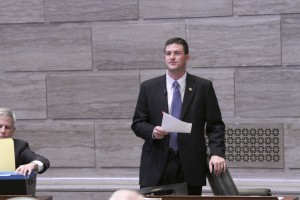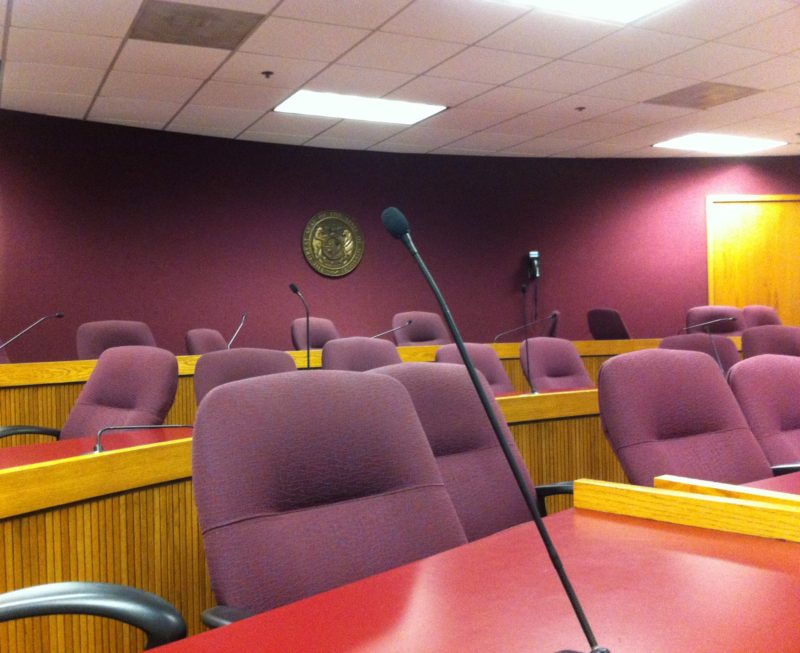JEFFERSON CITY, Mo. — Two weeks ago, Ewell Lawson, Manager of Government Operations for the Missouri Association of Municipal Utilities was the most vocal opponent of SB 650 and 653, sponsored by Sen. Brad Lager, R-Savannah. He was singing a different tune in the House Utilities hearing for the bills on Thursday.
“653 has come a long way,” Lawson said.
“I’m glad to hear the Kumbaya,” Committee Chair Rep. Doug Funderburk said.
SB 649, 650, 651, 652, and 653 passed out of the House Utilities Committee on Monday. SB 653 received an amendment proposed by Rep. Holly Rehder, R-Sikeston, which added in prior and exclusively to one section. Ewell said the addition of that language allowed attachments to proceed during a rate dispute. The only bill that received a no vote on Monday was SB 650.

There were three amendments added to 653 before it passed 31-1 in the Senate. The first was for the exclusion of wireless antennas, which municipalities felt was a safety issue. The second was that a company must comply with a contract concerning the safety of operational matters before attachments are made. The third allows for the pole owners to deny usage when the attacher is in breach of contract. Lawson was happy with all of these amendments to the bill.
“Both sides have worked better than they have in any time in the last two years,” Lager said.
The main purpose of SB 653 is to provide a consistent rate for which municipalities can charge utility companies for pole attachments needed for cable. These are annual fees. The bill suggests the Federal Communication Commission formula be used to determine costs. Two original bills, HB 331 and 345, for this provision were passed into law last year but have been challenged in court. That bill genesis traces back to contentious contract negotiations between the city of Independence and Comcast Cable, in which Independence offered an increased rate from about $7 per pole to $29.50.
For many cities, the FCC rate is higher than the rate they currently charge for pole attachments
Lawson still disputed a “one-size fits all” approach to fees, but the bill does provide language allowing cities to seek financial compensation from telecommunications companies if the cities can prove their expenses are higher than what is covered by the fee.
SB 650 deals with the implementation of infrastructure, particularly towers. It passed 31-1 in the Senate. The goal of the bill is to keep municipalities from purposely delaying actions. The bill gives the city 120 days to either permit or deny new construction and 90 days for aesthetic improvements on existing structure.
Lager specified that the bill does not circumvent the planning and zoning. If a municipality can show that it is hearing the case in good faith, but that the specifics are taking longer, than the time period can be extended. The bill does not grant a company eminent domain; negotiations have to take place with a property owner.
What SB 650 specifically restricts is a city passing an ordinance raising the fees without a public hearing when an application for a permit is underway.

“A lot of it has to do with fees,” Missouri Cable and Telecommunication Association Executive Director Chuck Simino said. “We don’t want municipalities to gauge us by raising fees arbitrarily.”
About everything in the package of bills sponsored by Lager was covered in HB 331 and 345 last year. SB 649 is about right of way provisions, SB 651 is about emergency situations, and SB 652 is about railroad right of ways. SB 649, 651 and 652 passed 32-0 in the Senate. There was no opposition to any of those three bills on Thursday.
The bills should have equal support in the House. Rep. Kathryn Swan, R-Cape Girardeau, sponsored the bill in the house. She says she is an advocate for Lager’s bills because they limit the roadblocks for broadband buildup in Missouri.
“These have bipartisan support,” she said. “There are multiple reasons it benefits the state.”



